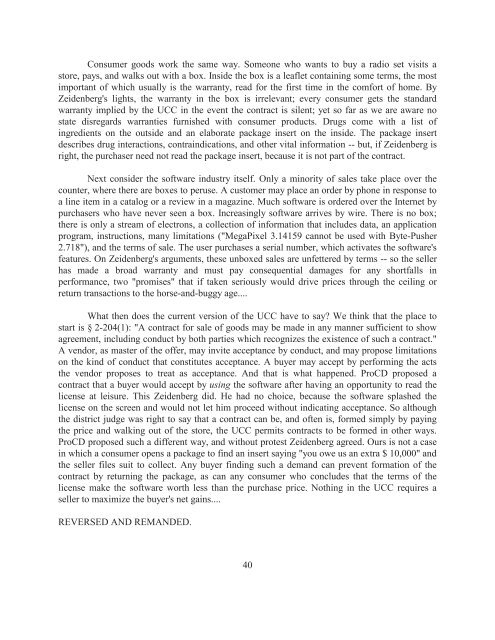Sales and Leases - A Problem-based Approach, 2016a
Sales and Leases - A Problem-based Approach, 2016a
Sales and Leases - A Problem-based Approach, 2016a
You also want an ePaper? Increase the reach of your titles
YUMPU automatically turns print PDFs into web optimized ePapers that Google loves.
Consumer goods work the same way. Someone who wants to buy a radio set visits a<br />
store, pays, <strong>and</strong> walks out with a box. Inside the box is a leaflet containing some terms, the most<br />
important of which usually is the warranty, read for the first time in the comfort of home. By<br />
Zeidenberg's lights, the warranty in the box is irrelevant; every consumer gets the st<strong>and</strong>ard<br />
warranty implied by the UCC in the event the contract is silent; yet so far as we are aware no<br />
state disregards warranties furnished with consumer products. Drugs come with a list of<br />
ingredients on the outside <strong>and</strong> an elaborate package insert on the inside. The package insert<br />
describes drug interactions, contraindications, <strong>and</strong> other vital information -- but, if Zeidenberg is<br />
right, the purchaser need not read the package insert, because it is not part of the contract.<br />
Next consider the software industry itself. Only a minority of sales take place over the<br />
counter, where there are boxes to peruse. A customer may place an order by phone in response to<br />
a line item in a catalog or a review in a magazine. Much software is ordered over the Internet by<br />
purchasers who have never seen a box. Increasingly software arrives by wire. There is no box;<br />
there is only a stream of electrons, a collection of information that includes data, an application<br />
program, instructions, many limitations ("MegaPixel 3.14159 cannot be used with Byte-Pusher<br />
2.718"), <strong>and</strong> the terms of sale. The user purchases a serial number, which activates the software's<br />
features. On Zeidenberg's arguments, these unboxed sales are unfettered by terms -- so the seller<br />
has made a broad warranty <strong>and</strong> must pay consequential damages for any shortfalls in<br />
performance, two "promises" that if taken seriously would drive prices through the ceiling or<br />
return transactions to the horse-<strong>and</strong>-buggy age....<br />
What then does the current version of the UCC have to say? We think that the place to<br />
start is § 2-204(1): "A contract for sale of goods may be made in any manner sufficient to show<br />
agreement, including conduct by both parties which recognizes the existence of such a contract."<br />
A vendor, as master of the offer, may invite acceptance by conduct, <strong>and</strong> may propose limitations<br />
on the kind of conduct that constitutes acceptance. A buyer may accept by performing the acts<br />
the vendor proposes to treat as acceptance. And that is what happened. ProCD proposed a<br />
contract that a buyer would accept by using the software after having an opportunity to read the<br />
license at leisure. This Zeidenberg did. He had no choice, because the software splashed the<br />
license on the screen <strong>and</strong> would not let him proceed without indicating acceptance. So although<br />
the district judge was right to say that a contract can be, <strong>and</strong> often is, formed simply by paying<br />
the price <strong>and</strong> walking out of the store, the UCC permits contracts to be formed in other ways.<br />
ProCD proposed such a different way, <strong>and</strong> without protest Zeidenberg agreed. Ours is not a case<br />
in which a consumer opens a package to find an insert saying "you owe us an extra $ 10,000" <strong>and</strong><br />
the seller files suit to collect. Any buyer finding such a dem<strong>and</strong> can prevent formation of the<br />
contract by returning the package, as can any consumer who concludes that the terms of the<br />
license make the software worth less than the purchase price. Nothing in the UCC requires a<br />
seller to maximize the buyer's net gains....<br />
REVERSED AND REMANDED.<br />
40


















